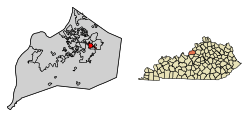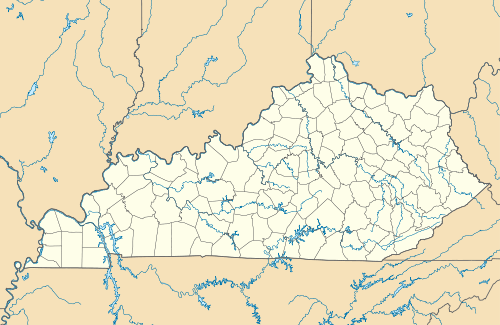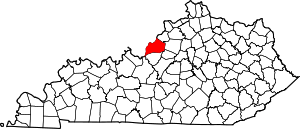Douglass Hills, Kentucky
Douglass Hills is a home rule-class city[3] in eastern Jefferson County, Kentucky, United States. The population was 5,484 at the 2010 census,[4] down from 5,718 at the 2000 census.
Douglass Hills, Kentucky | |
|---|---|
City | |
 Location of Douglass Hills in Jefferson County, Kentucky | |
 Douglass Hills Location within the state of Kentucky  Douglass Hills Douglass Hills (the United States) | |
| Coordinates: 38°14′10″N 85°32′52″W | |
| Country | United States |
| State | Kentucky |
| County | Jefferson |
| Area | |
| • Total | 1.33 sq mi (3.44 km2) |
| • Land | 1.33 sq mi (3.43 km2) |
| • Water | 0.00 sq mi (0.00 km2) |
| Elevation | 709 ft (216 m) |
| Population (2010) | |
| • Total | 5,484 |
| • Estimate (2019)[2] | 5,707 |
| • Density | 4,303.92/sq mi (1,661.96/km2) |
| Time zone | UTC-5 (Eastern (EST)) |
| • Summer (DST) | UTC-4 (EDT) |
| ZIP Code | 40243 |
| FIPS code | 21-22204 |
| GNIS feature ID | 1669500 |
| Website | cityofdouglasshills |
History
Douglass Hills was farmland from 1813 until the 1970s. Some of it was owned by James J. Douglas from 1896 until his death in 1917. Douglass Hills was incorporated in 1973 as the farmland was turned into subdivisions, originally under the name "Douglass Place".
Geography
Douglass Hills is located in eastern Jefferson County at 38°14′10″N 85°32′52″W (38.236070, -85.547641).[5] It is bordered to the east and south by Middletown, to the west by Jeffersontown, to the northwest by Blue Ridge Manor and Sycamore, and to the north by Louisville.
U.S. Route 60 (Shelbyville Road) forms part of the northern boundary of Douglass Hills, leading east 18 miles (29 km) to Shelbyville and west 12 miles (19 km) to downtown Louisville. Interstate 64 passes 0.5 miles (0.8 km) south of Douglass Hills, with access from Exit 17 (Blankenbaker Parkway).
According to the United States Census Bureau, Douglass Hills has a total area of 1.3 square miles (3.4 km2), of which 0.6 acres (2,363 m2), or 0.07%, are water.[4]
Demographics
| Historical population | |||
|---|---|---|---|
| Census | Pop. | %± | |
| 1980 | 4,384 | — | |
| 1990 | 5,549 | 26.6% | |
| 2000 | 5,718 | 3.0% | |
| 2010 | 5,484 | −4.1% | |
| Est. 2019 | 5,707 | [2] | 4.1% |
| U.S. Decennial Census[6] | |||
As of the census[7] of 2000, there were 5,718 people, 2,428 households, and 1,626 families residing in the city. The population density was 4,286.0 people per square mile (1,659.9/km2). There were 2,553 housing units at an average density of 1,913.6 per square mile (741.1/km2). The racial makeup of the city was 89.28% White, 6.94% Black or African American, 0.05% Native American, 1.77% Asian, 0.07% Pacific Islander, 1.22% from other races, and 0.66% from two or more races. Hispanic or Latino of any race were 2.90% of the population.
There were 2,428 households, out of which 29.9% had children under the age of 18 living with them, 56.6% were married couples living together, 8.0% had a female householder with no husband present, and 33.0% were non-families. 27.9% of all households were made up of individuals, and 8.9% had someone living alone who was 65 years of age or older. The average household size was 2.36 and the average family size was 2.89.
In the city, the population was spread out, with 22.4% under the age of 18, 7.7% from 18 to 24, 28.3% from 25 to 44, 28.0% from 45 to 64, and 13.6% who were 65 years of age or older. The median age was 40 years. For every 100 females, there were 94.8 males. For every 100 females age 18 and over, there were 91.6 males.
The median income for a household in the city was $60,021, and the median income for a family was $73,670. Males had a median income of $51,566 versus $31,196 for females. The per capita income for the city was $31,994. About 1.6% of families and 3.0% of the population were below the poverty line, including 2.3% of those under age 18 and 4.6% of those age 65 or over.
References
- "2019 U.S. Gazetteer Files". United States Census Bureau. Retrieved July 24, 2020.
- "Population and Housing Unit Estimates". United States Census Bureau. May 24, 2020. Retrieved May 27, 2020.
- "Summary and Reference Guide to House Bill 331 City Classification Reform" (PDF). Kentucky League of Cities. Retrieved December 30, 2014.
- "Geographic Identifiers: 2010 Census Summary File 1 (G001): Douglass Hills city, Kentucky". American Factfinder. U.S. Census Bureau. Archived from the original on February 13, 2020. Retrieved May 25, 2018.
- "US Gazetteer files: 2010, 2000, and 1990". United States Census Bureau. 2011-02-12. Retrieved 2011-04-23.
- "Census of Population and Housing". Census.gov. Retrieved June 4, 2015.
- "U.S. Census website". United States Census Bureau. Retrieved 2008-01-31.

